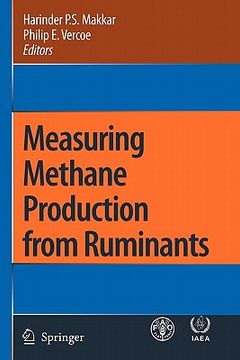Share
measuring methane production from ruminants (in English)
Harinder P. S. Makkar
(Illustrated by)
·
Philip E. Vercoe
(Illustrated by)
·
Springer
· Paperback
measuring methane production from ruminants (in English) - Makkar, Harinder P. S. ; Vercoe, Philip E.
$ 104.20
$ 109.99
You save: $ 5.79
Choose the list to add your product or create one New List
✓ Product added successfully to the Wishlist.
Go to My WishlistsIt will be shipped from our warehouse between
Friday, June 07 and
Monday, June 10.
You will receive it anywhere in United States between 1 and 3 business days after shipment.
Synopsis "measuring methane production from ruminants (in English)"
The world's livestock sector is amidst a major transformation, fuelled by high demand for meat and milk, which is likely to double over the next two decades in developing countries. The major driving force behind this demand for livestock products is a combination of population growth, urbanization and income growth, especially in developing countries. The challenge is to enhance animal productivity without adversely affecting the environment. A key to this is reducing methane emissions from ruminants. The major limitation to ruminant production in many tropical regions of Africa, Asia and Latin America, where a large proportion of the global ruminant population is located, is poor nutrition. The productivity of animals is restricted by the low nitrogen and high fibre content of the native grasses and crop residues, which form the basis of the diets in these regions. Animals on these types of diets emit more methane than animals fed better quality temperate forages. These methane emissions represent a loss of digestible energy to the animal (up to 15%) as well as a threat to the environment. Reducing methane production by ruminants could improve their productivity, provided the efficiency of ruminal metabolism is not compromised, and reduce their contribution to greenhouse gas emissions. The challenge is to devise nutritional strategies and identify dietary components, particularly from locally available plant resources, that reduce methane emissions.
- 0% (0)
- 0% (0)
- 0% (0)
- 0% (0)
- 0% (0)
All books in our catalog are Original.
The book is written in English.
The binding of this edition is Paperback.
✓ Producto agregado correctamente al carro, Ir a Pagar.

